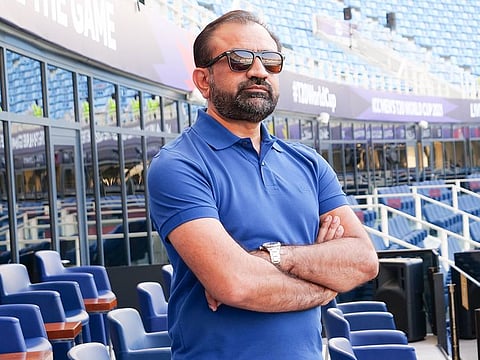ICC T20 World Cup, IPL: From allowing fans to keeping wickets fresh, Dubai rises to the challenge
Salman Hanif, Head of Cricket and Events of Dubai Sports City, looks back at two months

Dubai: The back-to-back hosting of Indian Premier League (IPL) and T20 World Cup has endorsed the UAE’s stature as a major cricketing hub once more - and Dubai has been at the centrestage of the carnival for last two months. It had been a huge challenge for all the stakeholders, but a top official of the Dubai Sports City believes it has been really worth the hard yards.
Salman Hanif, the Head of Cricket and Events of Dubai Sports City and his core team had pulled out all stops since mid-August and as the World T20 is in it’s final week now, Hanif says it had been a huge ‘‘collective effort’’ which would not have been possible without a huge support from the government authorities at every step.
‘‘There was no breather between two of the biggest cricketing events in the world. A World Cup, as you know, is planned three to four years in advance but here, we did not even get four months. There was hardly a seven-day break between the two and in addition, there was the responsibility of allowing spectators - something which was not there during IPL 2020,’’ Hanif said during an exclusive interview with Gulf News.
While the Dubai International Stadium, along with the two other venues in Abu Dhabi and Sharjah rose to the occasion last year for the IPL, the challenge was bigger on a number of fronts - namely the spectators, sustenance of the wickets and on the hospitality front this time. Comparing their experience between hosting last year’s IPL and the twin mega events this year, Hanif said: ‘‘The situation was unique last year as none had any experience of hosting an event during a pandemic. We were very fortunate to get the opportunity but there were a lot of challenges like uncertainty over flight operations, issuance of visas and Covid protocol. The successful delivery of IPL brought us into limelight and by the end of last year, the UAE were announced as the back-up venue.’’
Dwelling on the additional challenges this year, Hanif said: ‘‘For IPL, we got a go-ahead of 60% spectators’ capacity on the basis of our assurances. We had to implement the plan at the venue and then map it in the ticketing platform. The arrangements had to be spectator-friendly but there had to be social distancing, masks etc. We had to continuously provide information to the government departments as we were being monitored. Eventually, we got additional capacity approved for the World Cup, and now it’s about 80%.’’
This was the first time that seating arrangements were numbered in Dubai to ensure social distancing and it had to be implemented in the ticketing platform as well. ‘‘Once the configuration is done, you cannot change the seating arrangements. This apart, there were several precautionary measures like sanistisation of the entire stadium before each game - while we also employed ushers and trained them to guide the fans to their respective seats,’’ Hanif said.
While the UAE had acquitted itself creditably in it’s role of organisers, there were enough concerns if the wickets would become tired across three venues due to two virtually overlapping tournaments. While Oman stepped in to play a commendable role by hosting the qualifiers to give the wickets in the UAE a break, Hanif explained how they managed the cricketing challenge.
‘‘This was a point of concern for ICC as we were scheduled to host 13 IPL and as many World T20 games. However, the situation was marginally better than last year when we delivered 26 IPL games as there were at least a seven-day gap.
‘‘A lot of credit for the behaviour of the Dubai wickets should go to our chief curator Toby Lumbsden of Australia, who is with us since 2009. We have a table of nine pitches, where five are given for matches and four are for throwdowns. We didn’t use these stadium pitches since May so that the roots system stays in tact. If root system is strong, then grass grows back in 3-4 days. Fortunately, there have been no complaints,’’ said Hanif.
There was a point of time when at the business-end of IPL, the international teams had started converging in Dubai and got down to their practice sessions as well. ‘‘At the ICC Academy, our biggest challenge was the volume of activity - there were altogether 110 practice sessions for IPL while 80 practice sessions for World Cup. We could cater to it because of the range of facilities we have with 40 practice nets, two Oval grounds with 10 wickets each,’’ said Hanif.
‘‘It’s really staisfying to receive thumbs-up from some of the best cricketers of the world like Virat Kohli, Jasprit Bumrah and MS Dhoni. There was a touching gesture from Chennai Super Kings after they won the IPL when they left a message for our team on their dessing room white board,’’ Hanif noted with pride.
What next? ‘‘See, the World Cup was certainly like a jewel in our crown. We were already the No.1 venue in terms of hosting T20 internationals while we have hosted Asia Cup, IPL, PSL, Under-19 World Cup and all the works. We should be considered for more global events after this,’’ he added.
Sign up for the Daily Briefing
Get the latest news and updates straight to your inbox


